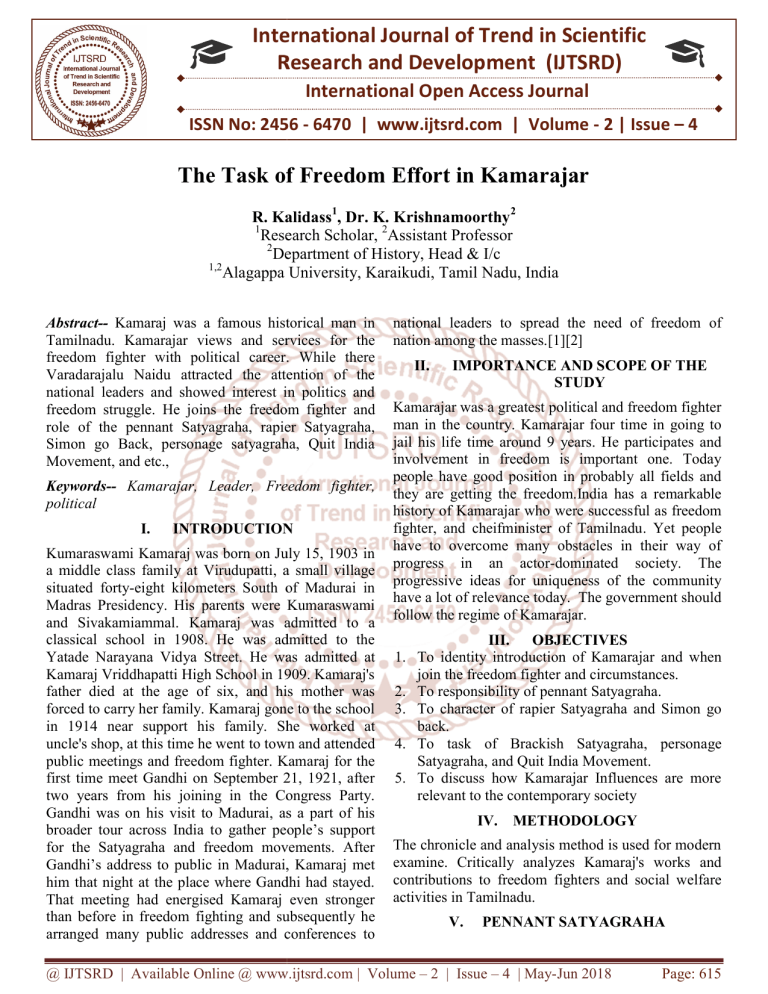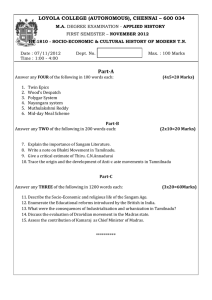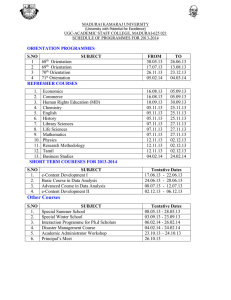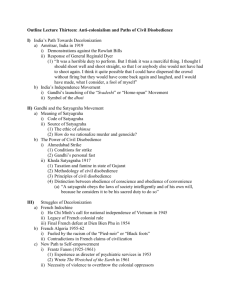
International Journal of Trend in Scientific Research and Development (IJTSRD) International Open Access Journal ISSN No: 2456 - 6470 | www.ijtsrd.com | Volume - 2 | Issue – 4 The Task of Freedom Effort in Kamarajar R. Kalidass1, Dr. K. Krishnamoorthy2 1 Research Scholar, 2Assistant Professor 2 Department of History, Head & I/c 1,2 Alagappa University, Karaikudi, Tamil Nadu, India Abstract-- Kamaraj was a famous historical man in Tamilnadu. Kamarajar views and services for the freedom fighter with political career. While there Varadarajalu Naidu attracted the attention of the national leaders and showed interest in politics and freedom struggle. He joins the freedom fighter and role of the pennant Satyagraha, rapier Satyagraha, Simon go Back, personage satyagraha, Quit India Movement, and etc., Keywords-- Kamarajar, Leader, Freedom fighter, political I. INTRODUCTION Kumaraswami Kamaraj was born on July 15, 1903 in a middle class family at Virudupatti, a small village situated forty-eight eight kilometers South of Madurai in Madras Presidency. His parents were Kumaraswami and Sivakamiammal. Kamaraj was admitted to a classical school in 1908. He was admitted to the Yatade Narayana Vidya Street. He was admitted at Kamaraj Vriddhapatti High School in 1909. Kamaraj's father died at the age of six, and his mother was forced to carry her family. Kamaraj gone to the school in 1914 near support his family. She worked at uncle's shop, at this time he went to town an and attended public meetings and freedom fighter. Kamaraj for the first time meet Gandhi on September 21, 1921, after two years from his joining in the Congress Party. Gandhi was on his visit to Madurai, as a part of his broader tour across India too gather people’s support for the Satyagraha and freedom movements. After Gandhi’s address to public in Madurai, Kamaraj met him that night at the place where Gandhi had stayed. That meeting had energised Kamaraj even stronger than before in freedom fighting ng and subsequently he arranged many public addresses and conferences to national leaders to spread the need of freedom of nation among the masses.[1][2] [1][2] II. IMPORTANCE AND SCOPE OF THE STUDY Kamarajar was a greatest political and freedom fighter man in the country. Kamarajar four time in going to jail his life time around 9 years. He participates and involvement in freedom is important one. Today people have good position in probably all fields and they are getting the freedom.India freedom. has a remarkable history of Kamarajar who were successful as freedom fighter, and cheifminister of Tamilnadu. Tamilnadu Yet people have to overcome many obstacles in their way of progress in an actor-dominated dominated society. The progressive ideas for uniqueness of the community have a lot of relevance vance today. The government should follow the regime of Kamarajar. III. OBJECTIVES 1. To identity introduction of Kamarajar and when join the freedom fighter and circumstances. 2. To responsibility of pennant Satyagraha. 3. To character of rapier Satyagraha and Simon go back. 4. To task of Brackish Satyagraha, personage Satyagraha, and Quit India Movement. Movement 5. To discuss how Kamarajar Influences are more relevant ant to the contemporary society IV. METHODOLOGY The chronicle and analysis method is used for modern examine. mine. Critically analyzes Kamaraj's works and contributions to freedom fighters fight and social welfare activities in Tamilnadu. V. PENNANT SATYAGRAHA @ IJTSRD | Available Online @ www.ijtsrd.com | Volume – 2 | Issue – 4 | May-Jun Jun 2018 Page: 615 International Journal of Trend in Scientific Research and Development (IJTSRD) ISSN: 2456-6470 British Government had banned, in 1923, the carrying of Indian National Congress’ flag in Nagpur residential areas. Congress Party announced Flag Satyagraha against this ban and Congress Party members from all over the country were invited to Nagpur to participate in the protest against the ban. From Tamilnadu, Kamaraj led the efforts and guided supporters to Nagpur. However, before their arrival to Nagpur, the Flag Satyagraha had been withdrawn.[3] VI. RAPIER SATYAGRAHA In 1927, British Government banned the carrying of swords and similar long knives by Indians. Congress Party decided to send a strong signal to the British against the ban. Sword Satyagraha was begun on June 16, 1927. Kamaraj and his friend K.S.Muthusamy of Virudunagar assisted the Satyagrahas by supplying them with half a dozen swords. Kamaraj also organised a procession in Virudunagar and his plan was to extend the procession to Madurai. At the procession Kamaraj went along with singing the patriotic songs of Bharathi (famous nationalist Tamil poet of the State).[4] VII. SIMON GO BACK Indian Statutory Commission (commonly known as Simon Commission after its chairman Sir John Simon) constituted by British Government, was strongly opposed by Congress Party as the Commission did not have any representatives from India. Nehru was already in action supporting the protests against the Commission. On February 18, 1929, the Simon Commission arrived at High Court premises in Madras and March 01, 1929 to Madurai. Kamaraj had arranged and organised thousands of Congress Party members for showing plaques with inscriptions of “SIMON GO BACK”.[5] VIII. BRACKISH SATYAGRAHA In 1930, Gandhi took Dandi March to defy salt law. In Tamilnadu, Rajaji led the Salt Satyagraha with volunteers from Tiruchi to Vedaranyam in Thanjavur district. Kamaraj gathered and guided the volunteers for the march and got arrested. On June 09, 1930, he was given two years of imprisonment and sent to Alipuram Jail. However, he was released from jail after Gandhi-Irwin Pact on March 12, 1931. This was the first imprisonment in his political career.[6] IX. PERSONAGE SATYAGRAHA In October 1940 Gandhi had started individual Satyagraha after the horrible experiences in the past where multitudes of Satyagra his experienced violent treatments, which had resulted in mass casualties, by the British Government. Kamaraj was arrested on December 20, 1940 when he was on his way to Wardha, to secure the approval of Gandhi in the selection of individual Satyagraha, under the defense of India rules for speeches opposing contribution to Second World War fund. He was elected as Chairman of Virudunagar Municipal Council during his jail term. This was his third jail term.[7] X. QUIT INDIA MOVEMENT On August 08, 1942, the All India Congress Committee (A.I.C.C) that convened at Bombay passed the Quit India resolution. Gandhi wanted all his Congress men to actively get involved in this new movement with a never before stronger slogan, ‘Do or Die’. The resolution was proposed by Nehru. He stated that India’s selfrespect could not be auctioned and also called for an eternal struggle until freedom. Sardar Vallabhai Patel, who was later known as Iron Man of India, seconded the proposal On his way from Bombay to Tamilnadu, after participating in the A.I.C.C. meet, Kamaraj managed to escape the Police security that had been tightened at all the railway stations from Bombay to Madras to arrest all those Congress Party leaders who had taken part in the meet. He went to the house of his friend and State Congress Committee member K.R.Kalyanarama Iyer’s house. Kamaraj explained to him that he had to organise for the Quit India movement by meeting his Party men at Thanjavur, Tiruchi, Madurai and Tirunelveli before he get arrested. His friend envisaged that the Police may smell his presence at his residence and thus shifted Kamaraj to his friend Janab Mohammed Sulaiman’s out- house. Kamaraj successfully managed for the whole of next week, travelling to Tirunelveli as per his plan, without getting caught by the Police and meeting the key people to pass the information on the details and methods of protest. After a week, on August 16, 1942, after completing all the organising work for successful and Strong protest for Quit India, the task he had to complete, he called the Police and declared that he was ready to be arrested. Inspector Ezhuthachan met Kamaraj and explained to him that a Police man with arrest warrant had gone to Ariyalur and thus he had no objection to allow Kamaraj to rest for couple of days until the warrant comes back. But Kamaraj, who had already spent above three-thousand days in jail from his @ IJTSRD | Available Online @ www.ijtsrd.com | Volume – 2 | Issue – 4 | May-Jun 2018 Page: 616 International Journal of Trend in Scientific Research and Development (IJTSRD) ISSN: 2456-6470 earlier three terms, replied that many of his friends had been arrested and he had no pleasure whatsoever to stay out of jail. He further continued that staying in jail gives him more satisfaction than staying out.[8][9] CONCLUSION Kamarajar involved to the freedom struggle and circumstances. His responsibility of freedom movements and Kamarajar Influences are more relevant to the contemporary society. Kamarajar not studying but he is truely professional challenger and highly thinker so for achieve into the real life. Kamarajar solitary man such an iron man so for change into the early thoughts and systems nearby interval at rest now followed the Kamarajar procedure. References [1] Bakshi. S.R. K.Kamaraj – The Patriot and Statesman, (Anmol Publications, New Delhi: 1992). [2] Gausalya. S. Gandhi and Kamaraj, (Best Institute of Nonviolence and Women Studies (BINOWS), Madurai : 2002). [3] Kandaswamy. P. The Political Career of K.Kamaraj, (Concept publishing Company, New Delhi: 2001). [4] Sakthivel. K. Kamarajarin Porkala Aatchi (The Golden Rule of Kamaraj), (Avvai Publications, Chennai : 2003). [5] Eesanthimangalam Murugesan, Karmaveerar Kamarajar (Kamaraj – The Man of Action), (Ramaiah Publishers, Chennai: 2007). [6] Fortnightly Reports, August 1927, as quoted in S. Gausalya. [7] Kalaimani. N.V. Thesiya Thalaivar Kamaraj (Kamaraj – A National Hero), (Ashta Lakshmi Nilayam, Madurai: 1995). [8] Balan, G. Varalatril Vaazhum Sadhanai Sandrorgal, (Vanathi Publishers, Chennai: 2009). [9] Ganesan. P.C. Kamaraj-The Great National Leader, (Arunodhayam, Madras: 1975), p.47. as quoted in S. Lalithalakshmi, Kamaraj-The Administrator,(Unpublished Ph.D., thesis, University of Madras, TNA,1981). @ IJTSRD | Available Online @ www.ijtsrd.com | Volume – 2 | Issue – 4 | May-Jun 2018 Page: 617



